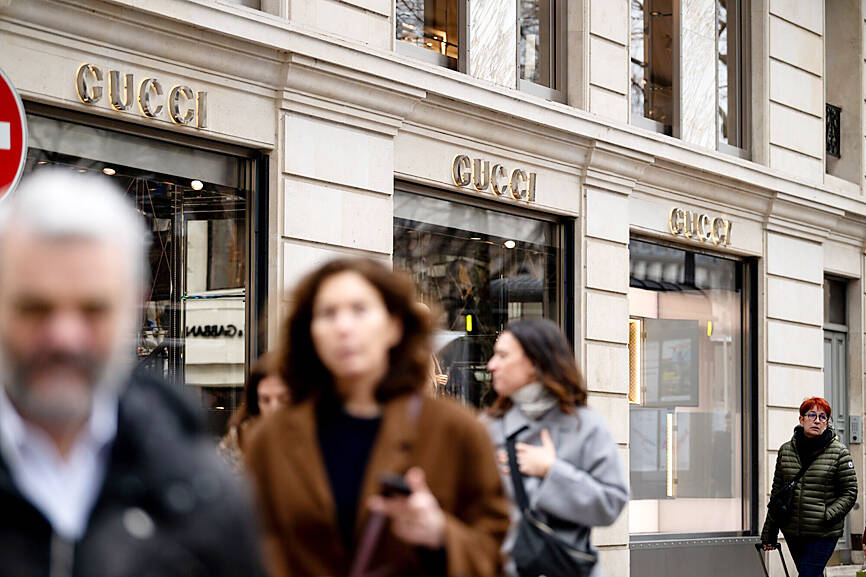French luxury giant Kering SA yesterday said that its sales and net profit fell last year, warning its investment strategy would weigh on results this year as it refocuses its business around its flagship brand Gucci.
Kering, whose other houses include Yves Saint Laurent, Balenciaga and Bottega Veneta, reported a 17 percent annual drop in net profit to 2.98 billion euros ($3.2 billion).
Sales retreated four percent to 19.57 billion euros, it said.

Photo: Bloomberg
“In a trying year for the group, we strengthened our organization and took significant steps to further enhance the visibility and exclusivity of our Houses,” Kering chief executive officer Francois-Henri Pinault said in an earnings statement.
“We are focused on revitalising Gucci, leveraging the unique blend of craftsmanship, Italian heritage and modernity that characterizes this iconic House,” he said.
At Gucci, a brand famous for its leather handbags, sales dropped six percent to 9.9 billion euros — accounting for half of Kering’s revenue.
Creations by Gucci’s new creative director Sabato de Sarno, who was appointed in January last year, are to go on sale in the coming weeks, Kering chief financial officer Armelle Poulou said.
Kering also changed Gucci’s management last year, appointing deputy CEO and Pinault confidant Jean-Francois Palus to replace Marco Bizzarri, who had led the brand since 2015.
Among other brands, Yves Saint Laurent sales were down four percent at 3.18 billion euros last year while Bottega Veneta slumped five percent to 1.6 billion euros.
Looking ahead, Kering warned that its investment strategy would weigh on the group’s full-year operating income.
“In a market environment that remains uncertain in early 2024, our continuing investments in our Houses will put pressure on our results in the short term,” Pinault said.
The company also cited “ongoing economic and geopolitical uncertainty.”

Semiconductor business between Taiwan and the US is a “win-win” model for both sides given the high level of complementarity, the government said yesterday responding to tariff threats from US President Donald Trump. Home to the world’s largest contract chipmaker, Taiwan Semiconductor Manufacturing Co (TSMC, 台積電), Taiwan is a key link in the global technology supply chain for companies such as Apple Inc and Nvidia Corp. Trump said on Monday he plans to impose tariffs on imported chips, pharmaceuticals and steel in an effort to get the producers to make them in the US. “Taiwan and the US semiconductor and other technology industries

SMALL AND EFFICIENT: The Chinese AI app’s initial success has spurred worries in the US that its tech giants’ massive AI spending needs re-evaluation, a market strategist said Chinese artificial intelligence (AI) start-up DeepSeek’s (深度求索) eponymous AI assistant rocketed to the top of Apple Inc’s iPhone download charts, stirring doubts in Silicon Valley about the strength of the US’ technological dominance. The app’s underlying AI model is widely seen as competitive with OpenAI and Meta Platforms Inc’s latest. Its claim that it cost much less to train and develop triggered share moves across Asia’s supply chain. Chinese tech firms linked to DeepSeek, such as Iflytek Co (科大訊飛), surged yesterday, while chipmaking tool makers like Advantest Corp slumped on the potential threat to demand for Nvidia Corp’s AI accelerators. US stock

The US Federal Reserve is expected to announce a pause in rate cuts on Wednesday, as policymakers look to continue tackling inflation under close and vocal scrutiny from US President Donald Trump. The Fed cut its key lending rate by a full percentage point in the final four months of last year and indicated it would move more cautiously going forward amid an uptick in inflation away from its long-term target of 2 percent. “I think they will do nothing, and I think they should do nothing,” Federal Reserve Bank of St Louis former president Jim Bullard said. “I think the

SUBSIDIES: The nominee for commerce secretary indicated the Trump administration wants to put its stamp on the plan, but not unravel it entirely US President Donald Trump’s pick to lead the agency in charge of a US$52 billion semiconductor subsidy program declined to give it unqualified support, raising questions about the disbursement of funds to companies like Intel Corp and Taiwan Semiconductor Manufacturing Co (台積電). “I can’t say that I can honor something I haven’t read,” Howard Lutnick, Trump’s nominee for commerce secretary, said of the binding CHIPS and Science Act awards in a confirmation hearing on Wednesday. “To the extent monies have been disbursed, I would commit to rigorously enforcing documents that have been signed by those companies to make sure we get